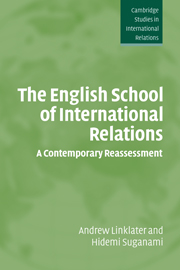Book contents
- Frontmatter
- Contents
- Acknowledgements
- Introduction
- 1 The idea of ‘the English School’ as a historical construct
- 2 The argument of the English School
- 3 The English School on ‘International Relations as an intellectual pursuit’
- 4 Progress and its limits: system, society and community in world politics
- 5 Cosmopolitanism and the harm principle in world politics
- 6 The sociology of states-systems
- 7 The good international citizen and the transformation of international society
- Conclusion
- Bibliography
- Index
- CAMBRIDGE STUDIES IN INTERNATIONAL RELATIONS
7 - The good international citizen and the transformation of international society
Published online by Cambridge University Press: 22 September 2009
- Frontmatter
- Contents
- Acknowledgements
- Introduction
- 1 The idea of ‘the English School’ as a historical construct
- 2 The argument of the English School
- 3 The English School on ‘International Relations as an intellectual pursuit’
- 4 Progress and its limits: system, society and community in world politics
- 5 Cosmopolitanism and the harm principle in world politics
- 6 The sociology of states-systems
- 7 The good international citizen and the transformation of international society
- Conclusion
- Bibliography
- Index
- CAMBRIDGE STUDIES IN INTERNATIONAL RELATIONS
Summary
In an important essay on the balance of power Butterfield (1966a: 147) maintained ‘that an international order is not a thing bestowed upon by nature, but is a matter of refined thought, careful contrivance and elaborate artifice. At best it is a precarious thing, and though it seems so abstract it requires the same kind of loyalty, the same constant attention, that people give to their country or to the other private causes which only the international order enables them to follow.’ Elsewhere he observed that what a historical survey of societies of states provides is ‘an impression of the tremendous difficulty of actually creating an international order where no firm basis for it previously existed. It looks as though (in the conditions of the past at least) a states-system can only be achieved by a tremendous conscious effort of reassembly after a political hegemony has broken down’ (quoted in Dunne, 1998: 125–6). Once established, international orders have faced the difficult challenge of how to admit ‘new units’, the best-known example being the way the Western powers dealt with pressures from Turkey, China, Japan and the former colonial territories to join international society during the twentieth century.
These comments illustrate the differences between the English School analysis of international society and the neo-realist approach to the international system – in particular, their very different conceptions of the importance of agency in world affairs.
- Type
- Chapter
- Information
- The English School of International RelationsA Contemporary Reassessment, pp. 223 - 258Publisher: Cambridge University PressPrint publication year: 2006

